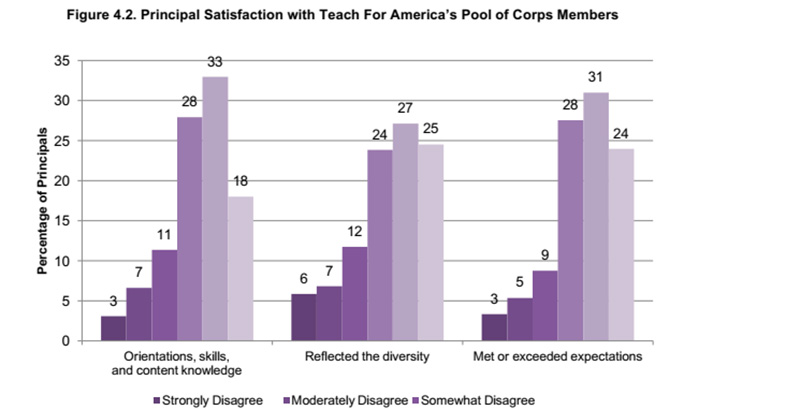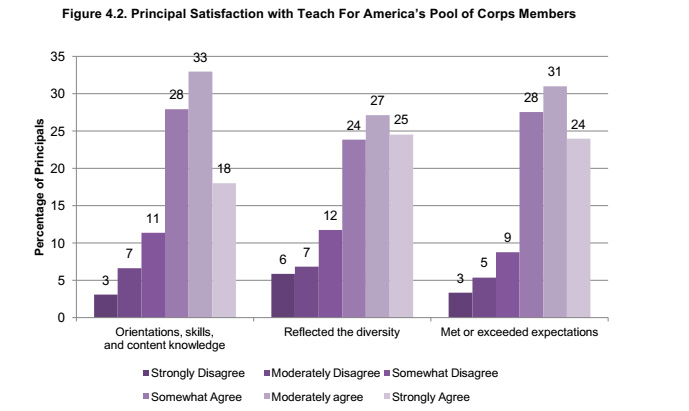Survey: Nearly 90 Percent of Principals Who Supervise TFA Members Would Recommend Hiring Them

The vast majority of principals surveyed in a new RAND Corporation poll said they approved of the performance of Teach for America corps members at their schools. Overall satisfaction with TFA teachers was high, though large pluralities of respondents said they might hesitate to hire corps members in the future because of deficits in their classroom management skills and their relatively short commitment to remain in the profession.
The survey is conducted online every two years to gather the opinions of school leaders who supervise teachers from the program, which has 7,000 corps members working in 53 regions across the country. After more than a quarter-century of growth as an institution that attracts recent college graduates to work in high-need schools, Teach for America has come in for bad press in the past decade amid charges that it leads to the ouster of career educators in favor of younger, whiter, and less prepared replacements. In response, the program has made efforts to diversify its recruits, and about half of all corps members now identify as people of color.
Past iterations of the poll, conducted by both RAND (in 2015) and Policy Studies Associates Inc. (in 2013), have yielded very high marks for TFA instructors, albeit tempered with specific reservations related to their limited, two-year tenure. (A 2011 study indicated that more than 60 percent of corps members elected to continue as teachers past the two-year mark.)
This year’s survey does not differ in either respect. Overall, 86 percent of respondents reported satisfaction with the performance of TFA teachers at their schools. Eighty-two percent said they would be willing to hire corps members to fill future vacancies, and 88 percent indicated that they would recommend hiring them to fellow principals.

Significant majorities reported that teachers from TFA made a positive impact on students’ academic growth, social-emotional learning, social identity development, recognition of injustice in the world, and ability to seek out relationships and resources to overcome boundaries.
Interestingly, while approval for program participants was high across the board, it was dampened somewhat among two groups: charter school principals and former Teach for America teachers who went on to lead schools.
TFA alumni (who constituted about one-fifth of the survey’s roughly 1,100 principals), not surprisingly, were much more familiar with the program’s training processes and institutional support of corps members. But they were only about two-thirds as likely as non-alums to rate TFA participants as “excellent” or “very good” at creating a range of 12 positive classroom conditions, from “engaging in rich problems” (35 percent versus 48 percent) to “understanding of cultural identity” (33 percent versus 46 percent) to “growing relationships with school staff” (36 percent versus 51 percent).
The lower ratings from charter school principals might be even more noteworthy, given the strong relationships between many charter school networks and Teach for America; some of the most famous TFA alumni have gone on to build their own high-achieving charters, like KIPP founders Mike Feinberg and Dave Levin.
“While, overall, both charter school and non–charter school principals had favorable impressions of corps members’ ability to create classroom environments that supported student growth and achievement, charter school principals systematically rated corps members lower,” the authors write.
The RAND researchers provide no explanation for why TFA alumni evince less favorable views of current corps members than other principals, though they observe that continuous changes to the program might result in “mismatched expectations” about the employees it provides. They also note the survey’s low response rate: just 43 percent, compared with 54 percent in 2015 and 66 percent in 2013. They attribute the decline to scheduling factors and general burnout from over-surveying.
The survey is released as former Teach for America participants have won headlines for reasons beyond their service as educators. Ahead of what promises to be a tumultuous midterm election cycle, and following complaints by teachers unions in recent years that TFA has unduly inserted itself in local political races, two figures strongly associated with the program have declared their candidacies for statewide office.
Mike Johnston, a TFA alumnus who later went on to become a principal and Colorado state senator, is now considered a strong Democratic contender for governor in 2018. In the legislature, Johnston pushed a reform-minded agenda that involved overhauling the state’s teacher evaluation system, and he is viewed as being friendly to charter schools.
Johnston has also spoken publicly about the merits of TFA, including at a celebration of the program’s 25th anniversary, where he said that he viewed education as the unfinished business of the civil rights movement.
Jared Henderson, the former executive director of Arkansas’s TFA branch, has also announced that he will seek the Democratic nomination for governor in that state’s upcoming election.
Get stories like these delivered straight to your inbox. Sign up for The 74 Newsletter

;)
